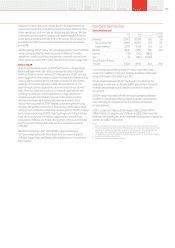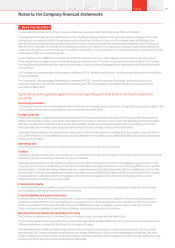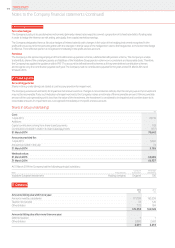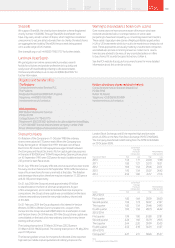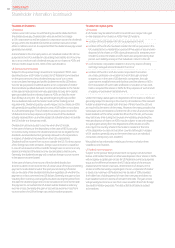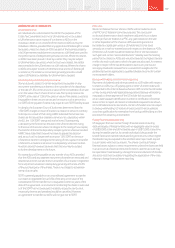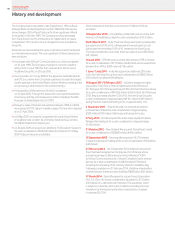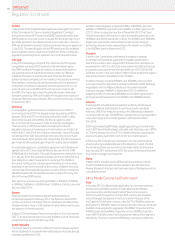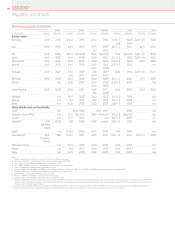Vodafone 2014 Annual Report Download - page 187
Download and view the complete annual report
Please find page 187 of the 2014 Vodafone annual report below. You can navigate through the pages in the report by either clicking on the pages listed below, or by using the keyword search tool below to find specific information within the annual report.
Articles of association
By a special resolution passed at the 2010 AGM the Company removed
its object clause together with all other provisions of its memorandum
of association which, by virtue of the Companies Act 2006, are treated
as forming part of the Company’s articles of association. Accordingly,
the Company’s articles of association do not specically restrict the
objects of the Company.
Directors
The Company’s articles of association provide for a Board of directors,
consisting of not fewer than three directors, who shall manage the
business and affairs of the Company.
The directors are empowered to exercise all the powers of the Company
subject to any restrictions in the articles of association, the Companies
Act (as dened in the articles of association) and any special resolution.
Under the Company’s articles of association a director cannot
vote in respect of any proposal in which the director, or any person
connected with the director, has a material interest other than by virtue
of the director’s interest in the Company’s shares or other securities.
However, this restriction on voting does not apply to resolutions (i)giving
the director or a third party any guarantee, security or indemnity
in respect of obligations or liabilities incurred at the request of or for the
benet ofthe Company, (ii) giving any guarantee, security or indemnity
to the director or a third party in respect of obligations of the
Company for which the director has assumed responsibility under
an indemnity orguarantee, (iii) relating to an offer of securities of the
Company in whichthe director is entitled to participate as a holder
of shares or othersecurities or in the underwriting of such shares
or securities, (iv)concerning any other company in which the director
(together with any connected person) is a shareholder or an ofcer
or is otherwise interested, provided that the director (together with any
connected person) is not interested in 1% or more of any class of the
Company’s equity share capital or the voting rights available to its
shareholders, (v)relating to the arrangement of any employee benet
in which the director will share equally with other employees and
(vi)relating to any insurance that the Company purchases or renews for
its directors or any group of people including directors.
The directors are empowered to exercise all the powers of the Company
to borrow money, subject to the limitation that the aggregate amount
of all liabilities and obligations of the Group outstanding at any time
shall not exceed an amount equal to 1.5 times the aggregate of the
Group’s share capital and reserves calculated in the manner prescribed
in the articles of association unless sanctioned by an ordinary resolution
of the Company’s shareholders.
The Company can make market purchases of its own shares or agree
todo so in the future provided it is duly authorised by its members
in a general meeting and subject to and in accordance with section 701
of the Companies Act 2006.
At each AGM all directors who were elected or last re-elected
at or before the AGM held in the third calendar year before the current
year shall automatically retire. In 2005 the Company reviewed its policy
regarding the retirement and re-election of directors and, although
itisnot intended to amend the Company’s articles of association
in thisregard, the Board has decided in the interests of good corporate
governance that all of the directors wishing to continue in ofce should
offer themselves for re-election annually.
Directors are not required under the Company’s articles of association
tohold any shares of the Company as a qualication to act
as a director, although executive directors participating in long-term
incentive plans must comply with the Company’s share ownership
guidelines. Inaccordance with best practice in the UK for corporate
governance, compensation awarded to executive directors
is decided by a Remuneration Committee consisting exclusively
of non-executivedirectors.
In addition, as required by The Directors’ Remuneration Report
Regulations, the Board has, since 2003, prepared a report
to shareholders on the directors’ remuneration which complies
with theregulations (see pages 69 to 85). The report is also subject
to ashareholder vote.
Rights attaching to the Company’s shares
At 31 March 2014 the issued share capital of the Company was
comprised of 50,000 7% cumulative xed rate shares of £1.00
each, 26,439,960,221 ordinary shares (excluding treasury shares)
of 2020/21US cents each and 33,737,176,433 deferred shares
of US$0.00001 each.
Dividend rights
Holders of 7% cumulative xed rate shares are entitled to be paid
inrespect of each nancial year, or other accounting period of the
Company, a xed cumulative preferential dividend of 7% per annum
on the nominal value of the xed rate shares. A xed cumulative
preferential dividend may only be paid out of available distributable
prots which the directors have resolved should be distributed. The xed
rate shares do not have any other right to share in the Company’s prots.
Holders of the Company’s ordinary shares may, by ordinary resolution,
declare dividends but may not declare dividends in excess of the
amount recommended by the directors. The Board of directors may
also pay interim dividends. No dividend may be paid other than out
of prots available for distribution. Dividends on ordinary shares can
be paid to shareholders in whatever currency the directors decide,
using anappropriate exchange rate for any currency conversions which
arerequired. Holders of the Company’s deferred shares have no right
to dividends.
If a dividend has not been claimed for one year after the date of the
resolution passed at a general meeting declaring that dividend or the
resolution of the directors providing for payment of that dividend,
the directors may invest the dividend or use it in some other way for
the benet of the Company until the dividend is claimed. If the dividend
remains unclaimed for 12 years after the relevant resolution either
declaring that dividend or providing for payment of that dividend,
it willbe forfeited and belong to the Company.
Voting rights
The Company’s articles of association provide that voting on substantive
resolutions (i.e. any resolution which is not a procedural resolution)
at a general meeting shall be decided on a poll. On a poll, each
shareholder who is entitled to vote and is present in person or by proxy
has one vote for every share held. Procedural resolutions (such
as a resolution to adjourn a general meeting or a resolution on the
choice of Chairman of a general meeting) shall be decided on a show
of hands, where each shareholder who is present at the meeting has one
vote regardless ofthe number of shares held, unless a poll is demanded.
In addition, thearticles of association allow persons appointed as proxies
of shareholders entitled to vote at general meetings to vote on a show
ofhands, as well as to vote on a poll and attend and speak at general
meetings. The articles of association also allow persons appointed
asproxies by two or more shareholders entitled to vote at general
meetings to vote for and against a resolution on a show of hands.
Under English law two shareholders present in person constitute
a quorum for purposes of a general meeting unless a company’s articles
of association specify otherwise. The Company’s articles of association
do not specify otherwise, except that the shareholders do not
need to be present in person and may instead be present by proxy
to constitute a quorum.
Under English law shareholders of a public company such as the
Company are not permitted to pass resolutions by written consent.
185Overview Strategy
review Performance Governance Financials Additional
information


